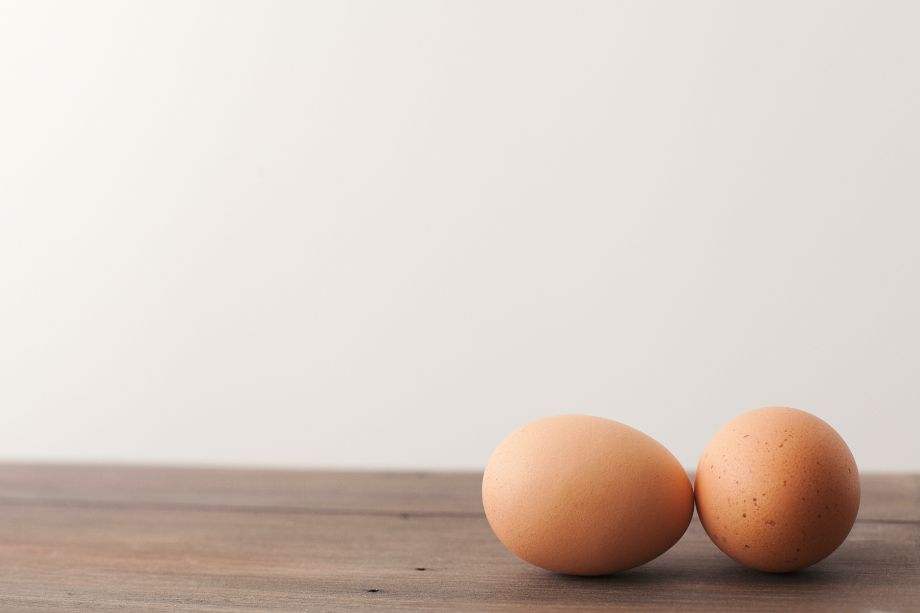We test and review fitness products based on an independent, multi-point methodology. If you use our links to purchase something, we may earn a commission. Read our disclosures.
Perhaps you’ve heard of the latest new diet fad: the 14-day egg diet. It’s yet another diet that promises rapid and dramatic weight loss by consuming simple, low-calorie meals, all centered around eggs. But is it really one of the best weight loss programs out there?
Whether you’ve only recently heard of the egg diet or have tried it yourself, you’ve come to the right place. For this article, we asked Destini Moody, RD, CSSD, LD, to cover what you need to know about the egg diet and determine if it’s even worth following.
RELATED: Diet-To-Go Meal Plans
Editor’s Note and Medical Disclaimer: This article is intended for educational and informational purposes only. It is not intended as a substitute for medical advice. Weight loss programs are not recommended for people with a history of disordered eating. For health advice, contact a licensed healthcare provider. If you need help with disordered eating, contact NEDA.
What Is the Egg Diet?
The egg diet, or the boiled egg diet, is centered around whole eggs. It is a low-calorie, high-protein, low-carbohydrate diet that aims to promote weight loss while preserving lean muscle mass. Eggs are certainly part of a balanced diet, but this fad diet is based on an extremely low caloric intake and the elimination of key food groups.
There is no true ‘egg diet plan,’ and it is a rather restrictive diet. The most common forms are an egg-only and a boiled egg diet. Most versions require you to consume three meals a day, with at least one meal based on eggs. Beyond that, you can expect to eat a few fruits, mostly non-starchy vegetables, and zero-calorie beverages. Some versions of the diet allow for whole grains, while others are more similar to a purely keto diet.

The egg diet isn’t new and hasn’t really changed much over time. While eggs are nutrient-dense, most registered dietitians urge individuals to avoid eliminating starchy foods and fruits, especially to the point of extreme calorie restriction.
“Though it’s great that the diet encourages a liberal consumption of vegetables, the decision to essentially make it a low-carb diet is odd and unnecessary. It’s always advised to balance a meal with all food groups, and doing so is still possible even if you want to lose weight,” says Moody.
RELATED: What Is the 75 Hard Challenge?
Egg Diet Variations
There are a few common variations of the egg diet:
- The egg-only diet. As the name states, this diet includes only eggs, cooked any way. The boiled egg diet is a variation of this. This is a very restrictive diet and is neither sustainable nor what dietitians would consider healthy eating.
- The 7-day egg diet. This is a more reasonable version of the egg diet. As you may have guessed, this diet lasts 7 days. This short-term, low-calorie diet is designed primarily for ‘rapid’ weight loss. It’s less restrictive, but egg consumption is high, and it limits food groups to mostly proteins, low-carb vegetables, and some berries.
- The 14-day egg diet. This is the same as the 7-day diet, but it lasts an extra week. It’s a more sustained approach to the above low-carb diet. This would be most likely to approximate a ketogenic diet as well.
- The keto egg diet. The goal of this diet is to enter and maintain a state of ketosis, generally through the consumption of high-protein, high-fat, and low-carb foods. In this version, you would consume one egg for every tablespoon of fat (like butter). You can add cheese to help jumpstart ketone production.
- The grapefruit diet. The grapefruit version of the egg diet consists mostly of grapefruit, eggs (in some forms), and little else.
RELATED: Best Keto Meal Delivery Service
What Can You Eat on the Egg Diet?
So what is allowed on the egg diet? There is no formal eating plan, so it varies. The simplest egg-only or boiled egg diet consists of exclusively cooked or hard-boiled eggs. This is a very restrictive way of eating and not recommended by registered dietitians.
The 7- and 14-day egg diets are more flexible and allow more food groups. Below are examples of foods you can expect to eat on the egg diet:
- Lean proteins: Eggs (boiled or otherwise), chicken, lean ground beef, lean cuts of steak, white fish, lean pork
- Low-carb vegetables: Leafy greens, kale, spinach, mustard greens, bell peppers, asparagus, mushrooms
- Fruit: Grapefruit, mixed berries
- Fats: Butter, mayonnaise, olive oil, coconut oil
- Beverages: Water or zero-calorie beverages, black coffee
RELATED: Best Egg White Protein Powder

What Can’t You Eat on the Egg Diet?
Even if you follow the more flexible version of the egg diet, many foods are still off-limits. Those include:
- Processed and/or fried meats
- Non-starchy veggies such as lentils, legumes, potatoes, rice, beans, whole grains, breads, cereals, squash, and processed foods
- Bananas, tomatoes, apples, stone fruit
- Fruit juices, sweetened drinks, electrolyte beverages (sweetened)
- Milk, cheese, cream, yogurt
Sample Egg Diet Plan
Below is a sample egg diet eating plan for 3 days. This is a generic guide, but I’ve tried to include foods that will maximize the consumption of healthy fats and essential nutrients.
| Meal | Day 1 | Day 2 | Day 3 |
| Breakfast | Boiled eggs, steamed spinach, grapefruit | Poached eggs, steamed broccoli | Mixed berries, lean ham, steamed asparagus |
| Morning Snack | Raw bell pepper slices | Grapefruit | Cantaloupe |
| Lunch | Boiled eggs, spinach, chopped mushrooms | Grilled turkey breast, steamed broccoli | Baked chicken breast, steamed broccoli |
| Afternoon Snack | Mixed berries | Mushrooms with steamed kale | Tuna fish |
| Dinner | Steamed fish, asparagus, steamed spinach | Sirloin steak, steamed spinach, and kale | Sirloin steak, grilled mushrooms, steamed kale |
The meal plan above is loosely based on the most popular versions of the egg diet. It will be low-calorie, high-protein, and have minimal carbohydrates. I advise eating this diet only for short-term weight management (7 to 14 days).
RELATED: How Many Grams of Protein In An Egg?
Egg Diet Benefits
Eggs are relatively nutrient-dense. They’re high in protein, choline, and vitamin D. Even the most flexible version of the egg diet will offer minimal health benefits, even if you add more healthy foods instead of adopting a dogmatic approach to following the diet. That said, there are a few benefits to note below.
Emphasis on Nutrient-Dense Foods
When it comes to essential nutrients, eggs are tough to beat (pun intended). Eggs are protein-dense (with around 6 grams per egg) and high in choline, vitamin D, and folate. They’re basically carbohydrate-free.
Eggs work well with almost any food and are versatile in the kitchen. They go well in salads and soups (such as ramen) and are great as a snack. A 2023 review1 of multiple randomized controlled trials showed that high egg consumption promoted muscle protein synthesis and weight loss. Plus, their high protein content can help keep you full.
“Including eggs in each of your meals is one of the best ways to get your protein needs in, whether you are shooting for weight loss or muscle gain. Including sources of high-quality protein like eggs in each meal also promotes satiety, which can help control excessive hunger and promote muscle maintenance,” says Moody.
Encourages the Avoidance of Processed Foods
The egg diet ultimately eliminates processed foods, which is a loosely defined term. The Mayo Clinic defines processed foods as sweetened beverages, snack candies, reconstituted meats, cereals, and ready-to-eat foods. Processed foods have been associated with an increased risk of cancer2, cardiovascular disease3, and obesity4.
“Some forms of the diet also recommend eliminating sugar, but it’s important to make the distinction that added sugars are what people should limit their intake of. It’s not advised to avoid natural forms of sugar, like those found in dairy or fruits, as these foods still offer significant health benefits,” Moody adds.
RELATED: A Beginner’s Guide to the Warrior Diet
Egg Diet Drawbacks
Fad diets usually have more drawbacks than health benefits. The egg diet is no exception. Here are the more important risk factors to consider.
Low Calorie Intake
The egg diet promotes weight loss through ultra-low calorie intakes. While low-calorie diets may help with weight management, they aren’t sustainable. The lack of carbohydrates means you are missing a key source of energy, which can lead to fatigue. That also means declines in physical activity performance and potentially lean muscle mass. Such a low calorie intake also likely means much more cravings throughout the day.
The egg diet also does not specify a specific calorie intake. This can be challenging if you have specific weight loss goals and energy demands.
RELATED: Best Low-Calorie Meal Delivery
High Cholesterol and Fat
Eggs are high in cholesterol and saturated fat, both of which are implicated in heart disease. Studies show mixed results when looking at eggs, cholesterol levels, and health outcomes1.
However, the egg diet incorporates foods that are also high in cholesterol and fat. The American Heart Association recommends limiting intake of both, as well as eggs. This is especially true for people who have existing risk factors such as high blood pressure, obesity, and diabetes.
Low in Essential Nutrients
While eggs are a decent source of protein and vitamin D, the egg diet adds little else. The egg diet in its purest form is scarce in vitamins, minerals, and other nutrients. This means you risk becoming deficient in many nutrients, particularly calcium and fiber.
Calcium is important for bone health and muscle contraction. Low calcium intake can increase your risk of cardiovascular disease5. Low fiber intake is also associated with an increased risk of cardiovascular disease6. Poor fiber intake is also associated with impaired gut health and digestion, as discussed in this 2022 review7. If you want to try the egg diet, I would advise considering multivitamins and fiber supplements, at a minimum, but you should definitely consult a medical professional.
RELATED: Best Biohacking Supplements
What You Need To Know About the Egg Diet: Final Thoughts
With an ultra-low calorie intake and an emphasis on a specific food item, the egg diet is little more than a fad diet. Add to that the lack of a formal eating plan, the short duration, and the exclusion of multiple food groups, and the diet leaves much to be desired.
Moody thinks the egg diet isn’t the worst for weight loss, but she recommends dieters include more starchy vegetables and grains like potatoes or rice.
Here are the most important things to consider about the egg diet:
- The egg diet consists almost exclusively of eggs. The most restrictive version allows only eggs, which we advise against.
- The more flexible version of the egg diet allows berries, grapefruit, cantaloupe, lean meats, non-starchy vegetables, and fats like butter.
- All versions of the egg diet are very low calorie, which may support short-term weight loss but is unsustainable in the long term.
- Eggs are high in protein and saturated fats.
- The egg diet may be lacking in important essential nutrients. Consider adding fiber supplements, fruits, and vegetables for more balanced nutrition.
- Eggs are high in cholesterol, which is a risk factor for cardiovascular disease, particularly among individuals with existing health conditions.
Finally, please be wary of any diet that emphasizes consuming a single food or extreme calorie restriction. Dieting for weight loss is okay when done in moderation and paired with appropriate exercise. It’s important to note that excessive dieting and extreme calorie restriction are hallmarks of eating disorders. If you find yourself dieting excessively, please consult a medical professional.
What You Need To Know About the Egg Diet: FAQs
What are the restrictions on the egg diet?
The most basic form of the egg diet allows only eggs and zero-calorie beverages. The more flexible version permits eggs, lean meats, mixed berries, and non-starchy vegetables. It also advises against snacking and added sugars.
What are the side effects of the egg diet?
Such a low calorie intake can lead to muscle wasting, impaired physical performance, constipation, and fatigue.
What are the disadvantages of the egg fast diet?
The egg diet is not sustainable in the long term. It does not permit a high enough calorie intake for appropriate weight management. It is low in carbohydrates and fiber and can lead to deficiencies in some key nutrients.
Does the 14-day egg diet work?
The 14-day egg diet may work for short-term weight loss, but would likely not help you lose more than a couple of pounds.
Is the egg diet good for weight loss?
No. The egg diet, and any diet that advocates eliminating foods and extreme calorie restriction, is generally not advisable for long-term weight management. It can lead to excessive weight loss, changes in appetite, muscle wasting, and nutrient deficiency.
Further reading

Check out our FreeMotion t8.9b treadmill review to see what we really think about this super-expensive cardio machine. Read more

The Onnit Kettlebellsare like the most popular product the company sells. After using and reviewing nearly every kettlebell Onnit makes, including their character versions like the Star Wars collaboration, we are confident in the quality and durability of the Onnit Kettlebells.They’re not the best value as there are other companies offering similar kettlebells at lower prices, but overall, we recommend Onnit Kettlebells and put them on our list of the best kettlebells. Read more

Perhaps you’ve heard of the latest new diet fad: the 14-day egg diet. It’s yet another diet that promises rapid and dramatic weight loss by consuming simple, low-calorie meals, all centered around eggs. But is it really one of the best weight loss programs out there?Whether you’ve only recently heard of the egg diet or have tried it yourself, you’ve come to the right place. For this article, we asked Destini Moody, » Read more about: What You Need To Know About the Egg Diet: Is This Fad Diet Worth Following? » Read more

Here we break down squat anatomy and squat biomechanics, plus how different factors can impact how you perform the classic squat. Read more

